Resources for Getting Help
Asking for help can be hard, so we’ve put together some information that might help you understand your options and feel more confident about taking the next step. The first few sections focus on domestic violence, but you can scroll to the bottom for information about sexual assault, stalking, or human trafficking.
Remember you can call our 24/7 Safeline at 828-586-1237 to ask questions and get answers directly from a trained, local advocate.
We also recommend these additional websites that have great information:
Questions you may have:
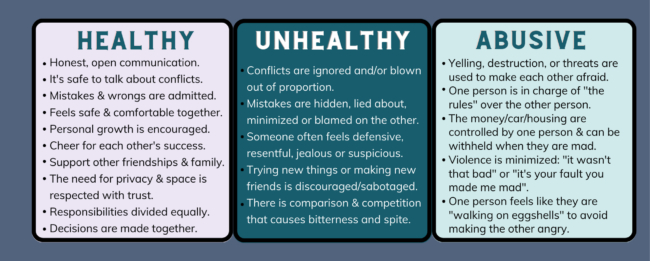
There are a lot of gray areas between unhealthy behaviors and abusive behaviors, but one way to tell the difference is to look at the power dynamic. In an unhealthy relationship, both partners have power but use tactics like yelling, lying, or criticizing to influence the other person’s behavior or to avoid talking about real issues.
In an abusive relationship, the victim’s behaviors are dictated by what the abuser wants/feels/needs at any given moment. This control is disguised as passion or protection. The victim feels like they can’t stand up for themselves, set boundaries, or ask for what they want because the abuser may become violent or withdraw their love/protection.
The power dynamic of domestic violence was originally identified by Domestic Abuse Intervention Project in 1984. The image of the wheel depicts how the center of domestic violence is always the abuser’s need for power and control over their victim. *This graphic was created based on women’s experiences with their male partners. Even though pronouns are assigned to the abuser/victim, anyone can be on either side of this power dynamic.
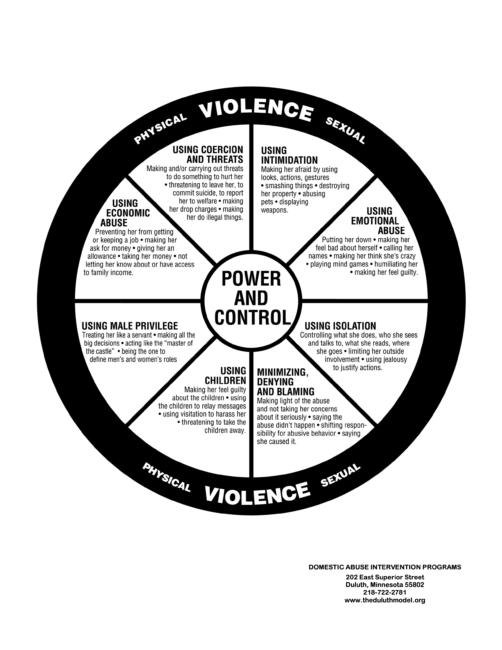
One reason why DV can be so hard to recognize is because it doesn’t happen all the time. Sometimes the actual violence is only a brief episode- one bad day or even one bad hour- followed by a period of remorse, hope, and calm. This allows the victim to remain in a state of denial about how dangerous the relationship actually is. The first step to breaking this cycle is recognizing it for what it is.
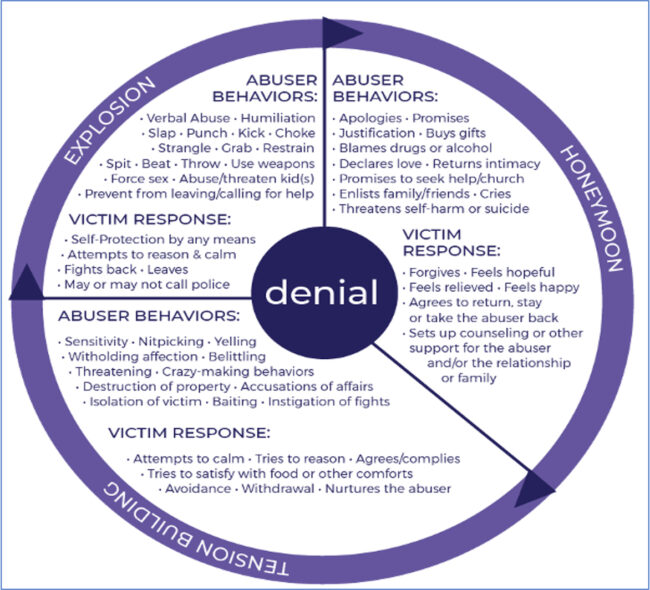
Mind games and emotional manipulation are often the first tactics of control, which is why people tend to get trapped in the relationship before they realize the danger. The graphic below shows examples of “red flags”, or the behaviors that show up before violence is introduced. Once you recognize a red flag, it’s up to you to set a boundary and let your partner know you will not remain in a relationship where these actions continue. A healthy partner will make real, permanent changes to correct the problem. An abusive person will
1) say it was your fault they acted that way and set rules for you to follow if you want to to avoid it happening again.
2) claim they can’t help it, or they have a right to be like that.
3) get so angry you will be afraid to bring it up again.
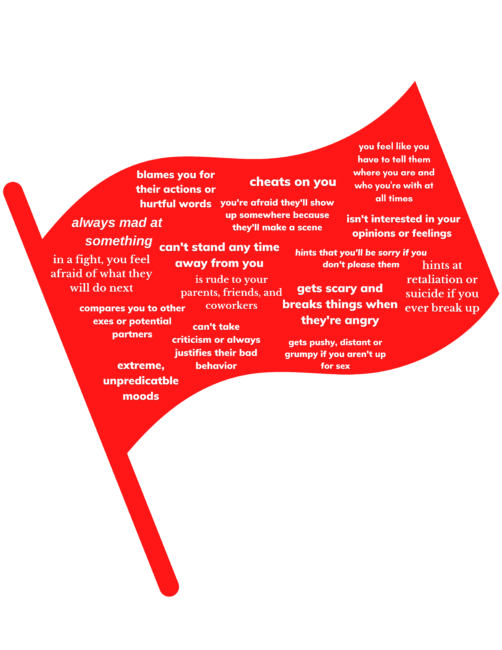
If your partner has ever hinted that they could be dangerous, it is important to take those signs seriously. You need to make a safety plan before you try to break up. MOST DV HOMICIDES OCCUR WHEN THE VICTIM IS TRYING TO BREAK UP OR HAS RECENTLY LEFT.
- Call CDP to talk to a trained advocate about your options. We can help with:
- Thinking through your risks and vulnerabilities
- Finding a confidential place to stay
- Getting security devices for your home
- Filing for a protective order.
- Filing charges if violence or property damage has occurred.
- Find a shelter
- In some cases, even with a protection order and security devices, it may not be safe to stay somewhere your partner can find you. If your abuser knows where all of your friends and family live, you may have to relocate to a shelter temporarily.
- There is currently no shelter in Jackson County, however you can find a list of shelters in the surrounding area on this website: Domesticshelters.org
- Calling around to find shelter, especially in a crisis, can be frustrating. A CDP advocate can help you with this process and make sure you find safety immediately.
A Domestic Violence Protection Order (called a DVPO or a 50B) is a legal document disallowing your partner, by law, to contact you in any way. If your partner violates this order, they can be arrested. In many cases, this is an important step in breaking free from your abuser, since they will now be accountable to the court system if they continue to threaten or harass you. That being said, if your partner is someone that does not care about the law or going to jail, you need to take additional steps to ensure they cannot find or harm you.
Our Advocates at CDP are here to walk you through the paperwork and court process of getting a protection order, as well as to ensure you have a lawyer on your side.
Important info:
- You need to file your paperwork with the county where you lived when the abuse occurred. If you have moved away, you can file in your new county (but your abuser will know your new city).
- If approved, your order will cover you no matter where you live.
- When filing your paperwork, explaining that there is an immediate risk of danger helps to ensure you are given protection right away. Not all protection orders are approved on the same day they are filed, so expressing the urgency of your situation is important.
- To put the order into effect, the sheriff’s deputy must find the abuser and deliver the paperwork to them, meaning the abuser will get a copy of everything you submitted. Make sure to leave off your address if you have moved.
- In Jackson County, you can file your paperwork 24/7, however you will need to come back to meet with a judge as soon as they are back in the courtroom, usually 1-2 business days.
- It will take at least 2 or 3 trips to the courthouse to finalize your protection order, but sometimes can be drawn out longer if there are criminal charges involved or if your partner gets their own lawyer.
- It’s important to have a lawyer at your court date (about 10 days after you file your paperwork). As a victim of domestic violence, you are eligible for a free lawyer from Legal Aid. You can get a referral to Legal Aid quickly through your CDP advocate.
- Police:
- The police will get involved if someone has reported a crime. In most cases, you will have a choice whether to press charges against your abuser for assault, property damage or harassment. This will initiate a police investigation and begin the court process.
- In some cases, charges against your abuser may be taken out on your behalf. This is usually the case if the police respond to an altercation where violence has obviously occurred.
- Note: The protection order is considered a civil order, so police will not be involved except to serve the paperwork to the abuser, or if your abuser violates the order and continues to threaten/harass you.
- Child Safety: In NC, any adult that has information about a child witnessing DV is mandated to report it to the Department of Social Services. Once DSS gets the report, they may reach out to you to make sure that you are taking steps to protect the child from witnessing future violence. Ultimately, DSS has your child’s best interest in mind, so their involvement can be an asset to your family’s recovery.
- You can learn more about the legal process here:
- CDP does not require any ID or citizenship documentation to receive assistance. Our only concern is for your safety.
- If you choose to report your abuser to the police and help bring them to justice, you can be eligible for a visa. Learn more about this here: Womenslaw.org
One tactic of abuse is to make sure the victim is completely dependent on the abuser. You are not alone in feeling trapped! In order to help you regain your independence, CDP will provide you with ongoing support regarding housing, childcare, employment, and mental/physical wellness. We will help you apply for assistance programs, find local resources, and build life skills to regain your confidence.
As a victim of DV, you have access to free legal support to help with custody and divorce proceedings. Ask your CDP advocate to connect you to this service.
First, do your best to understand what they are going through. Much of the abuse is emotional & psychological, so it is not as easy as just walking away.
Some reasons people might stay in a relationship:
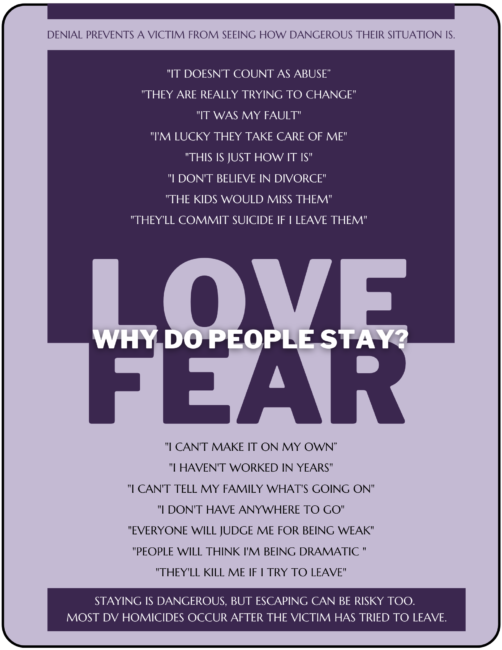
How you can help:
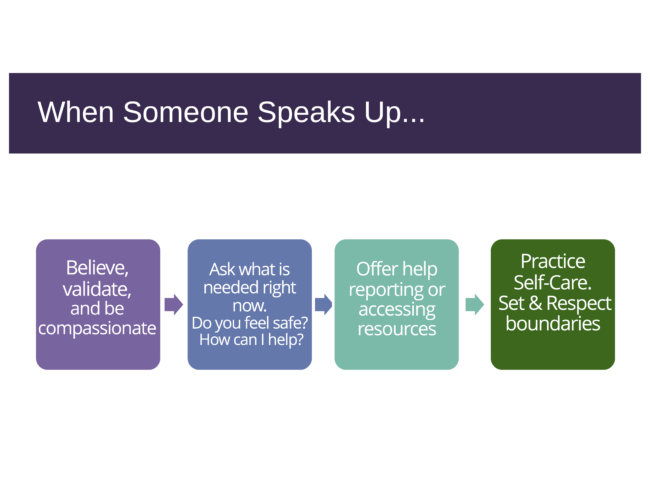
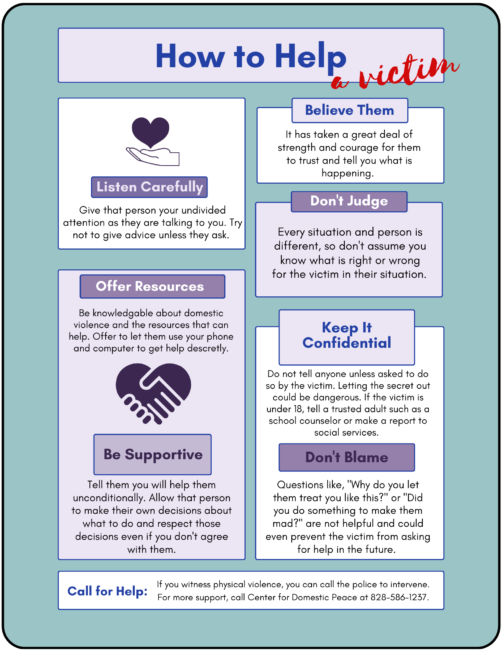
As frustrating as it can be to watch a victim return to an unsafe situation, remember that this is part of the process. The cycle of violence exploits the victim’s hope that things will get better, so it may take several episodes of violence before the victim sees the pattern for what it is. At that point, knowing they have your support and assistance can be a huge factor in their decision to leave. That’s why it is vital that you keep the door open for them to come to you for help. Read below for tips on what to say to build trust so that they will come to you when they are ready.
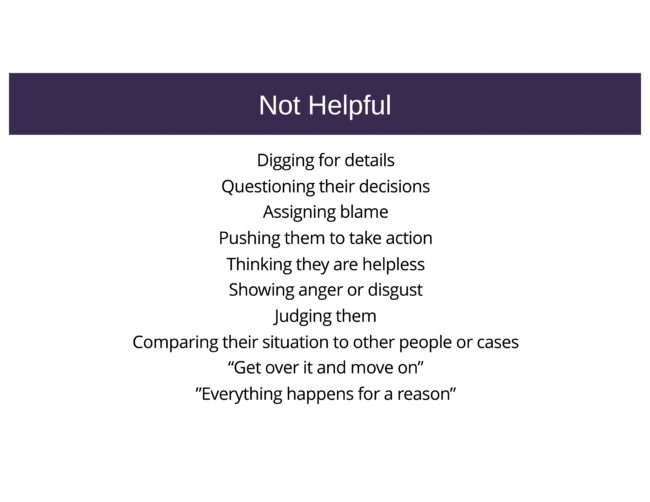
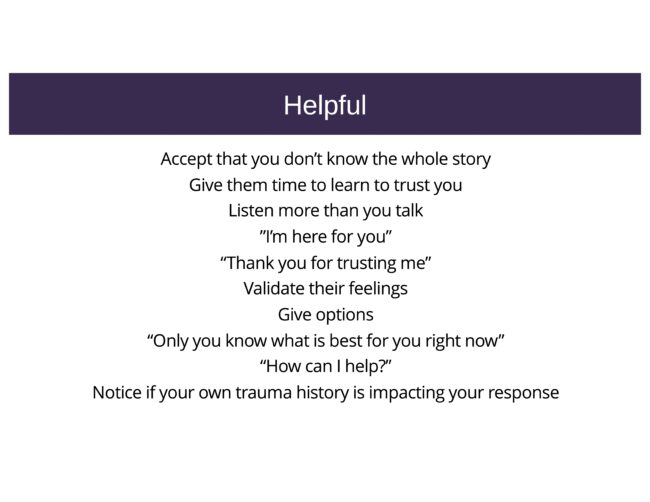
Establishing a line of open, trusting communication with your teen about their relationship is your #1 tool for keeping them safe. However, the nature of teenage development is to start exploring the world without you, so it’s also helpful to share some trusted sources they can use to find dating advice on their own.
We recommend these websites for information about teen dating safety.
Additionally, it’s vital that your child knows that if they are in trouble, you will be there to help them, not punish them for their part in the issue. Many teens are reluctant to tell their parents about abuse or mistreatment they’re going through because doing so would require admitting they did something they weren’t supposed to. Being your child’s supporter before anything else can make all the difference in whether or not your child asks you for help when they need it the most.
If you have been assaulted (as a resident of Jackson County), you have several options:
- Medical: Get a free Sexual Assault Nursing Exam (SANE) at Harris Regional Hospital in Sylva. This is an important medical exam & treatment to prevent STD’s and pregnancy. Additionally, you have the option to collect and preserve evidence of the crime. You do not have to make any decisions about reporting the assault at this time, but it is important to collect the evidence within a few days so that it can be on file if you choose to talk to the police. A CDP Advocate can meet you at the hospital to be on your team during the exam if you wish. They will make sure all of your questions are answered and that you understand your options.
- Police: There is no right or wrong answer about reporting to the police. Yes, the offender should be held accountable and prevented from assaulting someone else. However, going through the court process is not right for everyone. Learn more about your options here: www.rainn.org.
- Protection: If you feel unsafe after the assault because your offender is harassing or stalking you, you can file for a protection order. The type of protection order and the steps to get it depend on the circumstances. A trained CDP advocate can help you navigate this process. Additionally, CDP can provide safety planning info and equipment to help you feel safer. If you are a WCU student, additional resources are available to you for support and protection on campus.
- Trauma counseling: It is expected that a survivor of a crime will struggle with mental and emotional health after an assault. It’s important to get help from a licensed therapist to help process this trauma. CDP can offer free and timely crisis counseling from local therapists.
- Being forced, tricked, or coerced into providing services for someone else’s financial gain is considered Human Trafficking and it is illegal. A CDP advocate can help you make a plan for getting away from this situation and getting your freedom back.
- The hardest part of getting out of this situation is recognizing that it is happening at all. Learn more about human trafficking here: PolarisProject.org
A CDP advocate can help you make a plan for safety and potentially file for a protective order.
Learn more about stalking and safety planning here: Victimconnect.org
Learn more about tech safety here:
We are here for you. 24/7
Going through an abusive relationship is an experience that wears a person down, makes them doubt themselves, and convinces them that the abuse is normal. It is so easy to lose hope, but remember that there is help available 24/7. It is always okay to call just for information and guidance, even if you are not ready to make any changes. With support, it’s possible to end the abuse and move on into a life where you are treated with respect and kindness, just as you deserve to be treated.


